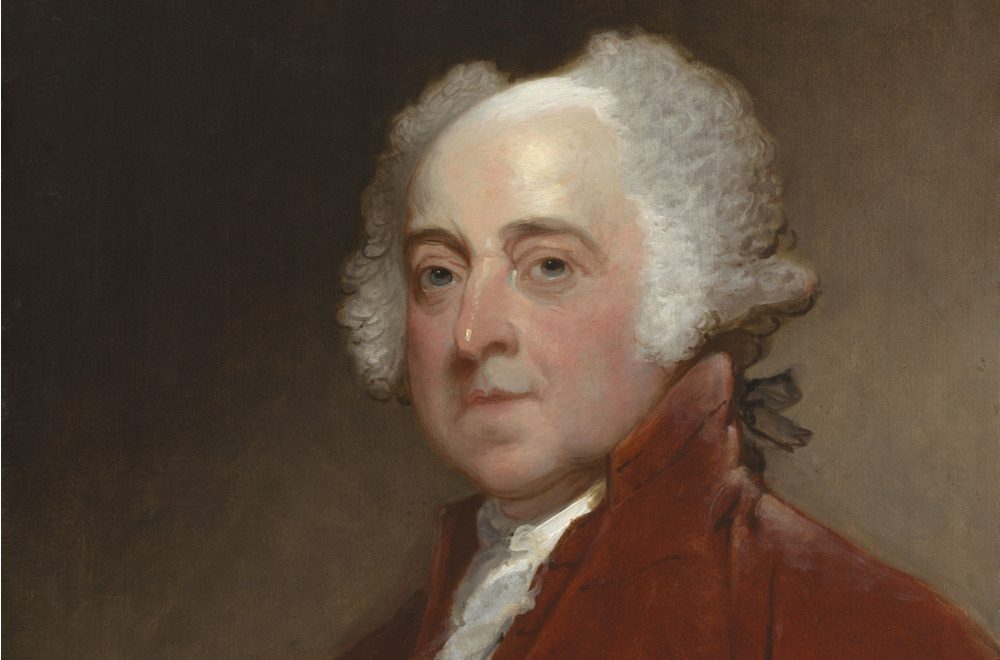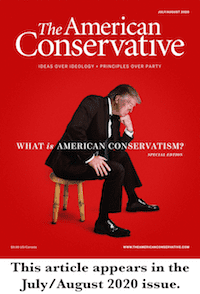The Most Endearing of the New Englanders Who Won Our Independence

The Education of John Adams, R. B. Bernstein, Oxford University Press, 311 pages, July 2020.
Two accounts of John Adams are current among Americans today. The first, purveyed by popular historian David McCullough in his mega-bestselling John Adams, focused on the Massachusettsian’s peculiar—though appealing—personality. Reading it, one might think that Adams had been a mere character. The other, developed by academic historian Gordon Wood in a chapter of his seminal The Creation of the American Republic, 1776-1787 entitled “The Relevance and Irrelevance of John Adams,” makes Adams an out-of-place if powerful thinker. Richard Bernstein’s new book joins the personality and political science of the Colossus of Independence.
Bernstein, the first lawyer to write an Adams biography, notes in his preface that “Adams lived with books at his elbow and a pen in his hand.” He early set himself the task of “teach[ing] his contemporaries and posterity what he had learned.” Bernstein’s account would be filled with “clashes of personality,” yes, but also with “principled intellectual disputes about political theory and practice.” As the second president put it in a famous missive to his beloved wife Abigail:
I could fill volumes with descriptions of Temples and Palaces, Paintings, Sculptures, Tapestry, Porcelaine, &c. &c. &c.—if I could have time. But I could not do this without neglecting my duty. The Science of Government it is my Duty to study, more than all other Sciences: the Art of Legislation and Administration and Negotiation, ought to take Place, indeed to exclude in a manner all other Arts. I must study Politicks and War that my sons may have liberty to study Mathematicks and Philosophy. My sons ought to study Mathematicks and Philosophy, Geography, natural History, Naval Architecture, navigation, Commerce and Agriculture, in order to give their Children a right to study Painting, Poetry, Musick, Architecture, Statuary, Tapestry, and Porcelaine.
Adams’s earnestness strikes one as his most appealing characteristic. His devotion to the needs of posterity ranks a close second.
As Bernstein explains early on, “Deciding between character without ideas…and ideas without character…is a false choice.” He opts instead for “juxtaposing [Adams’] ideas with his character.” Perhaps most people will miss the title’s allusion to the autobiography that won Henry Adams, John’s great-grandson and the very greatest American historian, a Pulitzer Prize. It is a clue that Bernstein will treat each important passage in the Bay State Founder’s extremely long life as both important—in several cases epically important—in itself and a formative experience for the man.
We begin our story with John Adams’s birth into a Congregationalist deacon’s family in Braintree, Massachusetts. Our John was a fifth-generation descendant of Adamses who arrived in Massachusetts Bay Colony “in 1632 or 1633” from Braintree, England “with Rev. Thomas Hooker, the Puritan clergyman who founded the colony of Connecticut,” and he counted two Plymouth Colony Pilgrims among his paternal ancestors. Having been tutored in his ABCs at an early age, John experienced substantial disappointment in his first pass at more advanced schooling. Here we find the famous story of Adams’s father fulfilling the small boy’s desire for some farming experience and the boy’s realization that there was something to book learning after all.
Placed under the tutelage of an able teacher in his 14th year, Adams proved an enthusiastic student. He came into possession of a set of Cicero’s writings—in Latin, of course—and decided that here was a model for his life. Bernstein notes that this seems to be the oldest surviving book from Adams’s substantial library. Its inscription says “John Adams His Book 1749/50.”
Harvard posed a bit of a puzzle to Adams: though the school that had been established to prepare Puritan ministers retained a religious tinge, young John disbelieved some of Calvinism’s chief doctrines. He therefore aimed to enter upon a lay career. Ranging intellectually well beyond the college’s curriculum, Adams exploited the colony’s largest library. He also launched a family tradition of keeping introspective diaries at this point. As Benjamin Franklin more famously did, Adams used his diary to weigh his behavior by his own idiosyncratic moral standard. Bernstein observes that in departing from Calvinist norms in this respect, Adams here launched upon “something new.”
After graduation, young Adams found himself in Worcester, which “seemed to him an intellectual wasteland.” He realized rather quickly that teaching striplings did not satisfy either his active intellect or his ambition. He would soon be an attorney, riding to courthouses in eastern Massachusetts Bay Colony and impressing all and sundry. He married a brainy woman of more important lineage than his. So far as we know, Abigail Adams became in the end a more helpful political confidant than any other wife of her era. Not only did she provide informed counsel, but she proved to be a fierce proponent of John’s when times were tough. She also willingly suffered through numerous lengthy separations.
The early event in Adams’s career for which we remember him now—his defense of the British soldiers indicted after the King Street Riot—could have ruined his career. Devoted as he was to Massachusetts’s English legal inheritance, however, he felt compelled to defend them. Adams and his co-counsel won all seven defendants’ acquittal on the major charges, though two ended with “M” (for “manslaughter”) branded on their thumbs.
Adams thrilled at the thought of the Boston Tea Party (which, Bernstein notes, he never knew by that name), musing that it would be a major turning point in history. He had become a patriot. Soon enough, he found himself calling for independence in the Continental Congress and writing a pamphlet describing a republican constitution appropriate to an American state. Bernstein asserts that Adams should be considered second only to James Madison among American constitutionalists, though he concedes that federalism remained essentially foreign to Adams. Adams’s pamphlet did indeed help to shape the earliest state constitutions, but his fixation on the “need” to cabin in aristocracy seemed increasingly foreign as time passed. (Madison, having read Adams’s Defence of the Constitutions of the American States in Philadelphia while serving in the Constitutional Convention, wrote Thomas Jefferson with an acid dismissal of it.) Herein lies the explanation of Gordon Wood’s characterization of Adams as eventually “irrelevant” to American constitutional thought.
If he reveled in having been born when he was due to his opportunity to participate in the American Revolution, John Adams proved extremely unfortunate by the end of the 1780s. Bernstein gives him more credit for his role in negotiating the Treaty of Paris than he deserves (the masterstroke yielding a western boundary at the Mississippi instead of the Appalachians resulted from John Jay’s inspired decision, in which Adams had no role, to ignore Congress’s instructions), and Our Hero had no role in drafting or ratifying the U.S. Constitution. He did however have a touching exchange with his former king upon presenting his credentials as American minister to the Court of St. James, matched by another such conversation at the time of his departure for America. (If his American enemies had known….)
Upon his return from Europe, Adams found in the new office of vice president good evidence that the old Chinese saying “May all your dreams come true” is indeed a curse: senators proved unwilling to be led in debate by the vice president, and he soon sulkily resigned himself to presiding more or less silently over their debates. His one substantial initiative, to have a fancy honorific title worthy of some minor Ottoman potentate attached to the president, earned Adams lasting mockery as “His Rotundity.” Adams believed that such frippery, like the ceremonial sword he wore on state occasions and the fancy carriage in which he rode to his presidential inauguration, must be brandished for the purpose of impressing the Europeans that the new American government merited respect.
Bernstein tells us that Abigail Adams grew as defensive of her husband as he was of himself during his single presidential term. We read of Adams’s error in retaining George Washington’s cabinet—whom he did not for a long time recognize as essentially a gaggle of mouthpieces of Alexander Hamilton—and of Adams’s fine performance in heading off a war with France. The recent discovery by Wendell Bird that the Adams administration prosecuted far more people under the Sedition Act than had previously been known goes unmentioned.
Bernstein claims that not pique or humiliation, but plain logistics accounted for Adams’s absence from his presidential successor’s inauguration. By this point, the reader wants to believe it. The end of the first Adams presidency, coming after a narrow Electoral College defeat (due to Aaron Burr’s machinations, John Jay’s compunction, or slave states’ built-in advantage under the Three-Fifths Clause), had significant long-run consequences. John Quincy Adams, an important player in his father’s diplomatic career during the Revolution and fit political heir thereafter, would devote his post-presidential career to getting even with the slaveholders he blamed for his and his father’s political defeats.
One place where Bernstein does John Adams an injustice is in regard to his record concerning slavery. John Adams not only served as chief author of the Massachusetts Constitution of 1780, the only constitution Massachusetts has known, which a Massachusetts court three years later read as having banned slavery in Massachusetts, but he chaired the congressional committee that drafted a Declaration of Independence vaunting the “self-evident [truth] that all men are created equal” and defended the section of that draft decrying the African slave trade—and indeed the fact that African slavery had ever been brought to the United States at all. One might have thought his antislavery record a substantial one.
But no. Bernstein says that Adams’s statement that he had long left resolving this problem in the South to Southerners rested on “unconscious racism,” and that, “His posthumous reputation as a foe of slavery and an advocate of equal rights regardless of race is open to serious question.” Perhaps interestingly, Roger Sherman of Connecticut, another member of the five-man committee that wrote the Declaration of Independence and the sole author of the statute that banned slavery in the Nutmeg State, made a similar statement about not interfering with Southern slavery in the Philadelphia Convention. One infers that Bernstein would read that comment the same way. If the man whose constitution banned slavery in Massachusetts and the man whose statute banned slavery in Connecticut had antislavery records too slight to justify sparing them aspersions based on their racial records, we are a censorious generation indeed.
Bernstein’s account of the famous twilight decade of correspondence between Adams and Thomas Jefferson, once an ex-friend and now a friend again, is a delight. Here Adams shines to his best advantage, impishly poking at the trite sophistries dear to his Virginian friend—and matching the younger Founding Father’s brilliant, flowing turns of phrase with equally brilliant, but oh so much different, letters of his own. Bernstein describes the excitement in the Adams household at the news that a letter from Mr. Jefferson has arrived, and various Adamses sitting around the table to listen to their patriarch’s enchanted reading of the newest of them. 
Like his short biography of Thomas Jefferson, which I recommended in these pages 16 years ago (Review of R.B. Bernstein, Thomas Jefferson, in The American Conservative (July 5, 2004), 28-30) as a well-wrought view of its subject, this short version of the life of John Adams by Richard Bernstein should long be a first resort for people who want a learned, fluent appraisal of our nation’s most important Yankee Founding Father. John Adams remains the most endearing of the New Englanders who won our independence—perhaps as flinty as the rest, yet so irresistibly human, ingenuous, American…an optimist in spite of himself—a man who wanted to be remembered for a lifetime of trying to do us, you and me, all the good he could—above all, a patriot.
Kevin Gutzman is author most recently of Thomas Jefferson—Revolutionary: A Radical’s Struggle to Remake America.
Comments